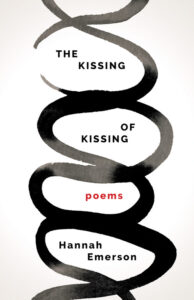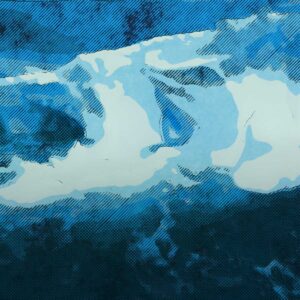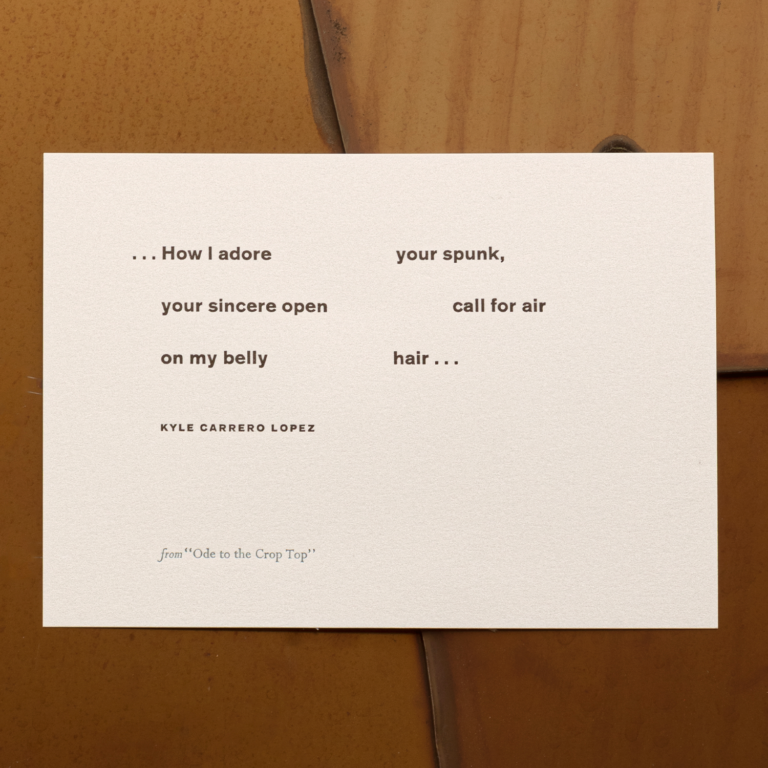Hannah Emerson
Keep Yourself at the Beginning of the Beginning
A poem inviting us to discover our brilliance and our nothingness. Both true. Both vital.
We’re pleased to offer Hannah Emerson’s poem, and invite you to sign up here for the latest from Poetry Unbound.
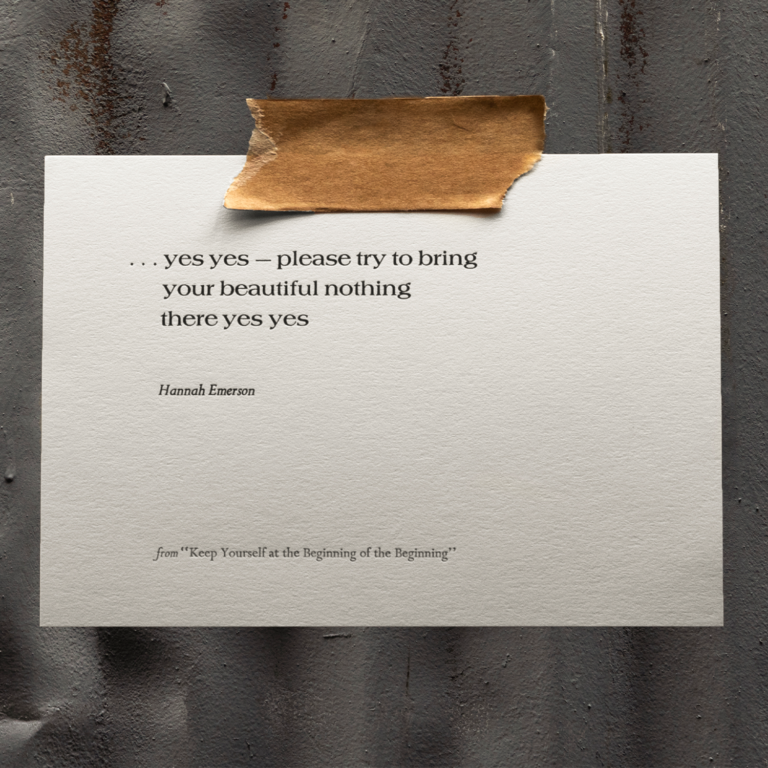
Letterpress print by Myrna Keliher. Photography by Lucero Torres. © All Rights Reserved.
Guest
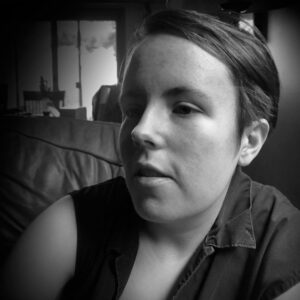
Hannah Emerson is the author of The Kissing of Kissing. She is also the author of a chapbook, You Are Helping This Great Universe Explode. Emerson is a nonspeaking autistic writer whose work has appeared in BOMB Magazine, the Poetry Society of America, Literary Hub, and the Brooklyn Rail. She lives in Lafayette, New York.
Transcript
Transcription by Heather Wang
Pádraig Ó Tuama: My name is Pádraig Ó Tuama, and when I was 15, I went to a youth festival — there was a couple of thousand people there — in the north of Ireland. And I was really confused, and I was feeling a bit overwhelmed with my thoughts. And this thought occurred to me: Everybody in this room is an “I.” Everybody in this room is the center of their own world. And all my anxiety kind of disappeared, and I looked around and thought: In which case, I’m tiny, and in which case, I’m one of many. And it was such a relief. And I looked at 2,000 people at this youth festival and then thought: That’s only 2,000. What about the rest of Ireland? What about the rest of the world? And suddenly, I felt tiny and deeply alive, all at the same time.
[music: “Praise the Rain” by Gautam Srikishan]
“Keep Yourself at the Beginning of the Beginning” by Hannah Emerson:
“Please try to help me go to the joy that is trying
to go to the beautiful helpful helpful beginning
of the beginning of the very trying freedom
that we make our great great great light
that is nothing but the laughter that is
fooling us into believing that we go
to the trash bin that is your life
that become the treasures
that live in the bottom
of the bin that is
your life yes
yes yes
yes –
please
try to dive
down to the
beautiful muck
that helps you get
that the world was made
from the garbage at the bottom
of the universe that was boiling over
with joy that wanted to become you you
you yes yes yes – please try to go to the colors
that kiss you great great great person of the light
that is becoming you you you yes yes – please
try to keep yourself in the bottom of the bin
yes yes – please try to go to the kissing
muck that is very true to your life yes
yes – please try to meet me there
yes yes – please try to bring
your beautiful nothing
there yes yes”
[music: “Dust of Summer” by Gautam Srikishan]
The first time I read this poem, I thought, what on Earth is happening? And who is speaking, and what are they saying? So I read it over and over again and was drawn so much into the music. This is a poem that you first of all feel, I think, and then hear, in the feeling, this profound pleading to recognize that the voices that say that you’re rubbish or garbage or in the trash or in the bin — those voices are implying you’re nothing. And what Hannah Emerson does so brilliantly is to say: You’re not rubbish, but you are nothing. You are the universe, exploding, and the nothing is an invitation into participation in what it means to be alive.
Hannah Emerson decenters humanity from being the center of the world. She stands at the edge and looks and says: Look at the solar system. Look at the universe. Look at stars. We are nothing. That’s not rubbish; that is the everything. Please try to get to the “beginning of the beginning.” This poem is a deep pleading to pay attention to the brilliance of your life, when we can recognize we’re so small. That isn’t rubbish. That isn’t discardable. That is both nothing and everything.
[music: “Daybreak” by Gautam Srikishan]
When I’m preparing a poem for Poetry Unbound, I’ll often print it out and read it loads of times over the course of weeks and think, what is this poem? What is its shape? What is its heart? So I was reading this poem in a café. And the poem is in a particular kind of shape where the first line is quite long, and then the next line gets shorter, and the next line, shorter, so it’s like an inverted triangle, down to just one word: yes. And then it expands again, and then it begins to contract again.
And I’d been reading it so often I didn’t know, what am I seeing? What’s the shape? So a waitress in the Grey Dog Café on West 16th in New York came across to me and said, “Can I help you with anything?” I think she meant, like, do you want another cup of coffee? And I said, “Yes — what shape do you see in this poem?” And she immediately said, “Mountains.” And then she laughed. And then I laughed. And I looked at it and thought, yes.
There’s something about a poem and the enormity of a mountain in it that is so true to this brilliant piece by Hannah Emerson. And also, there’s something in the poem that moved me, without even thinking about it, to ask somebody else. This is a poem that asks for an expansion, a beautiful joy, an opening up to what it means to be present in the universe.
[music: “Glinting Giant” by Blue Dot Sessions]
Hannah Emerson’s poems often repeat words. You can hear them in the music of this poem: “try,” “please,” “help,” “go,” “beautiful,” “yes” — there’s so many. “Try” is said six times in this poem, and “become” is said three times. And then, of course, there’s “yes yes yes,” “you you,” “great great.” “Kiss” is in so many different places in her work.
And repeating words is a way of creating music in the poem and creating echo, and also, then, creating a conversation with the reader. A poem where you’re hearing a yes echo back to a yes makes you think, do I agree with the yes? Am I the one saying “yes yes”? Is the poem saying “yes yes” to me? Is the poem trying to reassure me, or bring me into a conversation?
It’s a certain poem of persuasion and intimacy, but it’s also a poem that is in a certain form of the imperative. It’s giving an instruction: “Keep yourself at the beginning of the beginning.” And I’m sometimes nervous about poems that are in the imperative, but here, I think, this is a poem that pleads, that knows, you are the nothing. You are the universe, exploding in itself.
It can be helpful to know that the first book that Hannah Emerson published was called You Are Helping the Great Universe Explode. And I think that’s a little code into so much of her work. “You are helping the great universe explode” — it’s almost like you’re overhearing a quiet whisper at the beginning of the big bang, speaking, amazingly, to you, saying: Stay here. Watch. Look at the explosion. All the nothing that’s here will become the everything.
[music: “Daybreak” by Gautam Srikishan]
Hannah Emerson is a nonspeaking autistic poet from New York State. And you can get a real sense of the interests about her work from the titles of her books, You Are Helping This Great Universe Explode and The Kissing of Kissing. There’s a way within which the intimacy of her poetry is present in “kissing,” and being present as a speck in an expanding universe is also present throughout her work.
When she wrote about her poems, she said, “Please kiss the page that I write on trying to get you to see the universe in the way that I do yes yes. Please try to kiss the animal inside you trying to bite you yes yes. Please try to kiss the nothing that is waiting for you yes yes.” She knows so much about the animal inside you, trying to bite you. Is it trying to get out? Is it trying to be heard? Is it hungry? “Please try to kiss the nothing that is waiting for you.” That is an extraordinary invitation into recognizing how small we are, in the face of the everything that is everything, and that there’s joy in recognizing that.
[music: “Glinting Giant” by Blue Dot Sessions]
Toward the end of the poem there’s this line: “please try to meet me there / yes yes.” And, I mean, in some poems the poet directly addresses the reader, and this is one of them: “please try to meet me there.” This is a poem that directly addresses the reader and creates a beautiful connection, between the poet and the page and the page and the reader.
In any poem like this, that has an authority about it — “Keep Yourself at the Beginning of the Beginning” — or being told — I always want to ask of those kinds of poems, how do you know? Like, why should I trust you? Why should I take your advice? And when I ask that question, how do you know?, of this poem, I get the sense of a poet who’s gone to the kernel of what language means and, even deeper than what language means, a poet who’s gone to the kernel of, who am I? Who are we? Where are we? What are we?
I think those are lonely questions, but I’m so grateful for this poem that has come from such a profound engagement on the mystery of the human person being alive and observing and talking, like a speck in the great, vast, expanding universe.
[music: “Daybreak” by Gautam Srikishan]
“Keep Yourself at the Beginning of the Beginning” by Hannah Emerson:
“Please try to help me go to the joy that is trying
to go to the beautiful helpful helpful beginning
of the beginning of the very trying freedom
that we make our great great great light
that is nothing but the laughter that is
fooling us into believing that we go
to the trash bin that is your life
that become the treasures
that live in the bottom
of the bin that is
your life yes
yes yes
yes –
please
try to dive
down to the
beautiful muck
that helps you get
that the world was made
from the garbage at the bottom
of the universe that was boiling over
with joy that wanted to become you you
you yes yes yes – please try to go to the colors
that kiss you great great great person of the light
that is becoming you you you yes yes – please
try to keep yourself in the bottom of the bin
yes yes – please try to go to the kissing
muck that is very true to your life yes
yes – please try to meet me there
yes yes – please try to bring
your beautiful nothing
there yes yes”
[music: “Praise the Rain” by Gautam Srikishan]
Chris Heagle: “Keep Yourself at the Beginning of the Beginning” comes from Hannah Emerson’s book The Kissing of Kissing. Thank you to Milkweed Editions, who gave us permission to use Hannah’s poem. Read it on our website, at onbeing.org.
[music: “Praise the Rain” by Gautam Srikishan]
Poetry Unbound is: Gautam Srikishan, Erin Colasacco, Eddie Gonzalez, Lilian Vo, Lucas Johnson, and me, Chris Heagle.
Our music is composed and provided by Gautam Srikishan and Blue Dot Sessions.
This podcast is produced by On Being Studios, which is located on Dakota land. You may enjoy our other podcasts: On Being with Krista Tippett, Becoming Wise, and This Movie Changed Me. Find those wherever you’d like to listen, or visit us at onbeing.org to find out more.
Books & Music
Recommended Reading
The On Being Project is an affiliate partner of Bookshop.org and Amazon.com. Any earnings we receive through these affiliate partnerships go into directly supporting The On Being Project.





